Did you know that eating vitamin C, along with vitamin B12 doesn’t do the body any good? When you supplement zinc and copper together, you will still end up deficient in copper.
Many of us have included supplements as part of our daily health regimen. Our dependency on supplements has increased due to our busy schedules many of us experience nowadays. Sometimes we simply don’t have the time to cook a meal due to life getting in the way. So that leaves the option of vitamins by supplement.
It is often the case that we do not speak to a doctor, and we self prescribe our daily vitamins and minerals…because what’s the harm? They’re good for you, right?
While the chance of a life threatening illness is rare, it is there. So many people are not aware that vitamins and minerals can react not only with each other, but with medications, and can have a negative effect on the body. Some nutrients can interfere with the absorption, action or availability of other nutrients in ways that may affect your health as a whole.
Calcium and iron should not be taken together. Calcium inhibits the absorption of non-heme iron through the intestines. This can lead to an iron deficiency in people who solely eat plant based diets. To avoid this, take your iron in the morning and your calcium later in the day.
High doses of vitamin C might affect the absorption of vitamin B12 in the intestinal tract, and if you are already deficient in B12, this could pose a problem, so you might want to monitor your absorption.
High levels of vitamin E interfere with vitamin K’s blood clotting functions, so if you are on anticoagulant drugs, or take high levels of vitamin E, it’s a good idea to monitor your vitamin K absorption.
Did you know that zinc and copper compete for absorbency in the intestines? This can lead to copper deficiency. And if taking a high dose zinc supplement for an extended period of time, you would want to monitor your copper absorption. General recommendation is 10:1 balance of zinc to copper.
Calcium and magnesium compete for absorption in the intestinal tract in high doses. As much as they are both needed to work together for several physiological functions, and bone mineralization, high intake of one can actually inhibit absorption of the other. A good rule of thumb is to ensure you’re balancing your supplements of each, or eat foods that have both minerals in equal proportions.
Do not consume fat soluble vitamins with water soluble vitamins. Vitamin D is a fat soluble vitamin, and it should not be taken with B12, which is a water soluble vitamin. Did you ever mix oil and water together? We all know what happens.
Is there a better way to take them?
Distribute your supplements throughout the day. It’s always a good idea to take nutrients that react with each other at different times of day. For example, if you have Calcium at breakfast and iron at dinner, you will absorb both better.
But don’t fret over it too much. A varied diet is the way to go. Just ensure you are eating a wide range of food, and monitor if you are taking high doses of any supplements and it will pose less of a problem.
It is crucial to monitor nutrient levels when using supplements, especially when taking high doses, or combining supplements. It is imperative that you work with your Healthcare team to monitor levels and interactions, especially when taking other prescribed medications.
While staying vigilant in monitoring nutrient levels, we can ensure we are extracting all of the benefits of supplementation while minimizing interactions.
Reference: Times of India







I was diagnosed with MS (Multiple Sclerosis) four years ago, and despite taking various medications, my condition kept worsening. Last year, out of desperation, I tried an herbal treatment from NaturePath Herbal Clinic. I was skeptical, but within months, I noticed real improvements more strength, less fatigue, better mobility. I feel more like myself again.If you or someone you love is dealing with MS, I truly recommend looking into their natural approach. Visit www .naturepathherbalclinic .com